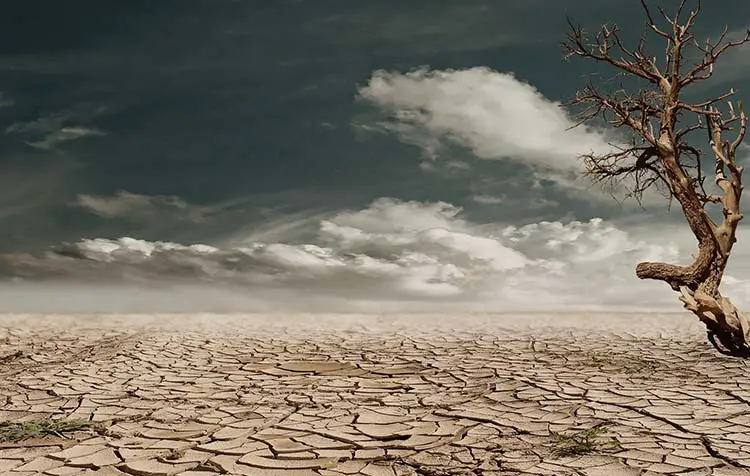Do you already know the environmental problem of water scarcity? It belongs without ifs and buts to the biggest environmental problems of our time. Since about 71% of the earth is covered by water₁, one might think that there is actually enough of it available. But unfortunately, only a fraction of it is drinkable at all. And it is already in short supply in many regions of the world, so that the environment and society are experiencing noticeable changes.
In this article, I would like to explain the problem of water shortage and show you why we Germans are also partly to blame for it and how we can do something about it in our everyday lives.
Here is another short Table of contents for you:
What does water scarcity mean?
The term water scarcity refers to an acute shortage of potable freshwater in certain regions of the world due to both high consumption, natural evaporation, and pollution. Water shortage, water crisis, or water emergency are also frequently used as synonyms for water scarcity.
Since the following terms are directly related to water scarcity, I would also like to explain them to you at the beginning of this article:
- Direct water consumption: The water consumption that results directly from your behavior in everyday life. For example, when showering, brushing your teeth or flushing the toilet.
- Indirect water consumption: The amount of water used to produce your consumer goods. For example, for clothing or food.
- Virtual water: Water consumed, evaporated or polluted during the manufacture of products.
Examples of water scarcity
The best, albeit most shocking, example of the emergence as well as the consequences of water scarcity is certainly represented by the Aral Sea in Central Asia depicted. A satellite image of the nose shows the full extent of human activity using two images 14 years apart. The eastern basin is now completely dry. Water from the tributaries was used for agriculture as early as the 1950s and 1960s, before they dried up in the 1980s. The ecosystem of the Aral Sea changed, fish disappeared - and with them the fishing industry.
In Germany The water shortage is affecting some cities in eastern Westphalia, for example - a total of around 120,000 people are affected by the water shortage there alone.₂
Another European example of water scarcity is provided by the French commune of Vittel where the groundwater level drops drastically every year. The reason for this is the privatization of water sources by the corporation Nestlé, which has come under worldwide criticism not only for this reason. Every year, about 750 million liters of water are pumped out in Vittel to be sold at a high price all over the world.₃
Water shortage facts, figures & statistics
In order to understand the true extent of the water shortage, I have collected some of the most important data around the environmental problem for you below:
- Every year, each person consumes an average of about 1 million liters of water.₄
- 97.5% are salty sea water and not drinkable for us humans. Therefore, many people think that there is no such thing as water shortage.₅
- Only 2.5% is drinkable fresh water. Unfortunately, only about 0.3% of that is directly accessible to us through rivers, streams, and lakes. 68.9% percent of potable water is iced over, 30.8% is in groundwater, and about 0.01% circulates in clouds, rain, snow, and hail.₆
- 2.1 billion people worldwide have no access to clean drinking water.₇
- Some 884 million people lack basic water services.₈
- In Germany, an average of 120 liters of water are consumed directly per capita and about 5200 liters indirectly.₉
- With 22.9 thousand km³, Sweden has the largest per capita freshwater resources in Europe.₁₀
- Globally, about 4,000km³ of freshwater is withdrawn annually, of which 70% is from the agricultural sector, 20% from industry, and 10% from the municipal level.₁₁
- We Germans consume about 4000 liters of "virtual water" per capita every day.₁₂
- More than 70% of Germany's drinking water is obtained from groundwater.₁₃
Causes of water scarcity
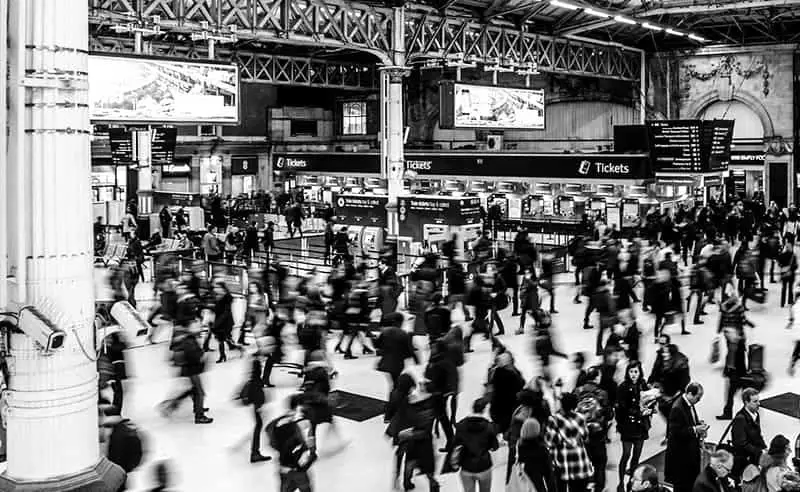
In addition to natural conditions such as the evaporation of water, the scarcity of available drinking water on earth is primarily man-made. I would like to explain briefly what is responsible for the fact that so many people are literally running on dry land.
Growing world population
Whereas in 1980 there were still around 4.45 billion people living on earth, by 2020 there will probably be 7.72 million.₁₄
This naturally also increases the demand for clean drinking water and food that needs to be irrigated. At the same time, however, the likewise increasing consumption means that more toxins are entering the rivers and groundwater.
Learn more about it in the article Overpopulation - All about global population growth.
Increasing consumption
The consumer behavior of each individual, in addition to the climate change and the rapid growth of the world's population are the main causes of global water scarcity. Even though we often focus on direct water consumption when investigating the causes, it is primarily indirect water consumption through the consumption of industrial and agricultural products that is responsible for the environmental problem of water shortage.
For example, animal feed must be irrigated in cultivation and cows must drink water. In this way, the production of one kilogram of beef requires around 15,500 liters of water. Even if this is hardly apparent at first glance, each product therefore indirectly consumes far more water.
Climate change as a reason for water shortage
In 2016, the average, global air temperature was already 0.94°C higher than in the middle of the 20th century.₁₅ Global warming is advancing by leaps and bounds and, in combination with the high water demand of the growing world population, is causing drought and ultimately global water scarcity.
Consequences of the lack of water
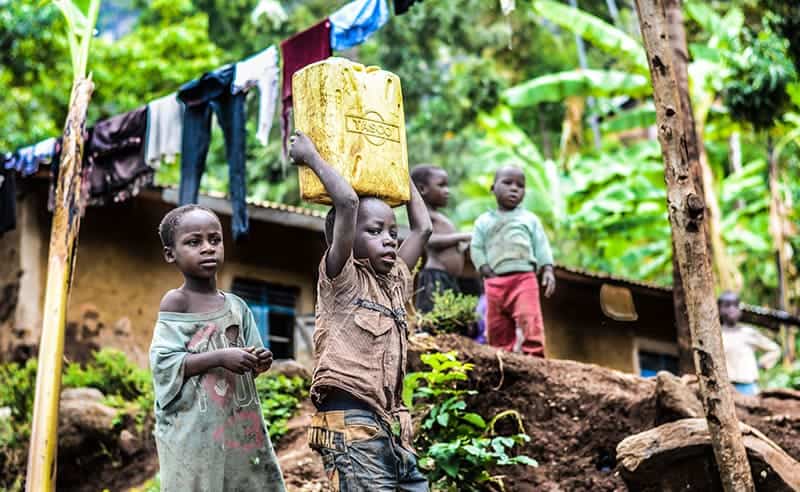
To what extent does scarce water affect the way people live together and the environment? The following ecological and social effects should be sufficient motivation for each and every one of us to do something about the global scarcity of water. Especially against the background that without water no life on this earth is possible.
Effects on the environment
When we consume and poison water, and more water evaporates, this does not remain without consequences. What ecological effects the lack of water has, you will now learn in the following points.
Rivers & lakes dry up
In Germany, the river "Schwarze Elster" in the south at the Brandenburg state border with Saxony has already dried up due to excessively long droughts. International example is, as already described, the Aral Sea. Global warming and excessive use for agricultural irrigation have completely dried up the eastern part of the lake.
Groundwater level drops threateningly
In Germany, too, water scarcity as a result of the increasing need for irrigation naturally results in the sinking of the groundwater table. In addition, there are economic interests, such as the pumping out of privatized water sources by corporations like Nestlé. Here I refer again to the example of the French municipality of Vittel, where an extreme case of water shortage has occurred.
The lowering of the groundwater level then also affects the water level of rivers such as the Elbe, from which in turn the Environmental problem of species extinction results.
Extreme droughts on the rise
The combination of climate change and water scarcity is naturally also increasing the number and extent of drought disasters. In Germany and Europe, but especially in eastern Australia and in many sub-Saharan African countries, droughts are now a permanent occurrence. The reason for this, in addition to dwindling freshwater reserves, is the lack of rainfall.₁₆
Species become extinct
Water is also the source of life for animals and plants. Increasing droughts and dried-up waters ultimately cost the lives of millions of animals and plants. The example of the Aral Sea is a good illustration of how water scarcity can wipe out entire ecosystems. Initially, fish populations declined until they finally died out completely, at least in the eastern basin of the lake.
Impact on society & economy
The laws of nature are above all. And if the global water shortage has ecological consequences, then it naturally also affects the way we humans live together. The following are some of the most discussed effects of water scarcity.
Armed conflicts over drinking water
A good example of this is the construction of a dam in northwestern Ethiopia. There, the resettlement of people, the destruction of nature and, above all, the sharing of water with Egypt are causing fierce social conflicts.
If global water scarcity cannot be contained in the future, there will be even more serious conflicts and water wars both between and within states.
Bottlenecks due to crop failures
Since most plants and fields have to be irrigated continuously, the consequences of a water shortage are likely to include crop failures that threaten the survival of the crop.
Example: The harvest of the winery "Vergenoegd" in South Africa has decreased by 1/5 within one year due to the water shortage. Famous wines can then no longer be delivered in the quantitiesn.₁₇ This is a classic example of the economic impact of the water crisis, as it can ruin entrepreneurs and annoy customers.
People starve
If no clean water is available, accordingly no plants can be irrigated and no animals can be supplied with drinking water. A consequence of this is therefore also the World hunger.₁₈
Contaminated drinking water & diseases
Since many people also illegally dispose of waste and toxins in rivers and lakes, both privately and professionally, the amount of drinkable water is shrinking.
According to Unicef, around 4.5 billion people do not use safe sanitary facilities.₁₉ Diseases can spread more quickly and pose a particular threat to young children, whose immune systems are not yet fully developed. Diseases can spread particularly quickly, for example, due to flooding or a lack of clean drinking water in hospitals.
Lack of water prevents school education
Since children in Africa in particular have to walk ever longer distances to the nearest water source every day, they are also less and less able to go to school. In addition, only about 69% of all schools worldwide have basic access to drinking water.₂₀
Solutions - What to do about water scarcity?
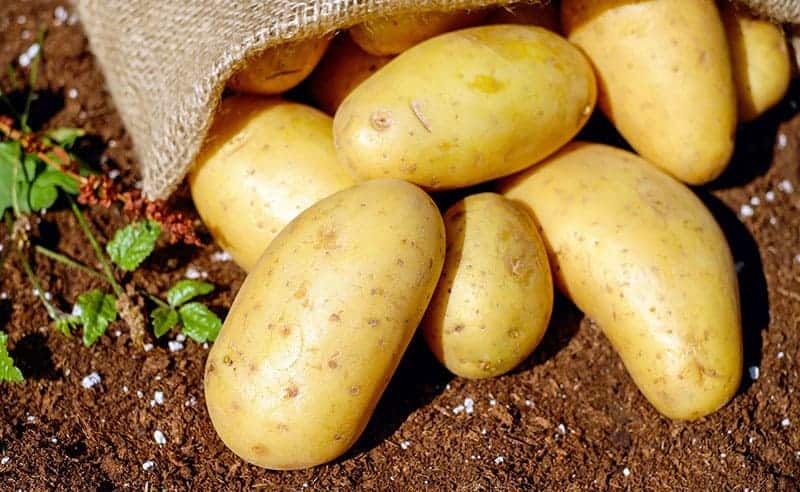
In order to effectively counteract the increasing water shortage, consumers, business and politics must pull together. A more conscious, sustainable lifestyle is, however, an important step in the right direction. Here I explain what you can do yourself and what is expected from politics & business.
What everyone can do against water scarcity
In addition to direct water consumption, indirect water consumption is the main cause of the environmental problem of water scarcity. Here are some tips on how to combat water shortages in everyday life.
Consciously save water
In the household you have many opportunities to effectively Save water. For example, use the following tips:
- Short shower: Depending on how long you shower, this can use up as much as 100 liters of water. Make it short and shower best cold - then the first challenge of the day has already been mastered and less energy consumed.
- Turn off the faucet while brushing your teeth: Wooden toothbrush moisten and turn off the tap again. Brush for three minutes and rinse briefly. What sounds relatively logical is unfortunately not the rule. But this of course saves a lot of water.
- Use rainwater: If you have the opportunity, why not catch some rainwater in a barrel and use the water to water the plants on the balcony or in the garden.
- Fill up the washing machine: Only turn on the washing machine when it is full. This way, the water and energy consumption is really worth it and you don't have to start the machine every day.
- Drink tap water: The quality of water from the tap is very good throughout Germany. Drink therefore Tap water instead of water from plastic bottles. In this way, you stop, for example, the drying up of regions with privatized water sources.
There are really hundreds of ways to reduce direct water consumption in everyday life. Just be aware of where you use water everywhere. With this water consumption calculator you can simply calculate how much water you consume directly every day. I ended up with about 50 liters - there is certainly still some potential upwards.
Consume more consciously
Since our personal, daily water consumption is primarily due to our consumption patterns, we also have many opportunities to reduce it in our everyday lives:
- Regional & seasonal food: Use our tips to reduce your food waste, so that your indirect water consumption also decreases. Consciously buy regional and seasonal food, since oranges from Spain, for example, have to be heavily irrigated again and cause water shortages locally.
- Eat less meat: Cattle drink thousands of liters of water and the feed also has to be watered. Including the cleaning of the stables, 15,500 liters of water are used for one kilogram of meat.₂₁
- Clothes: Cotton for clothing is mostly grown where it is hot and hardly rains. The fields are therefore irrigated with water from rivers and lakes, which dry out as a result. Fast Fashion therefore also creates water scarcity, which is why you should value existing clothing or second hand more.
- Vacation: Even more important than saving water in Germany, saving water is more beneficial in vacation regions where water scarcity is more extreme. The best example is the water crisis in Cape Town.
As already mentioned in the statistics, every German consumes an average of 5200 liters of water indirectly through his consumption behavior. So try to improve successively here as well and basically do something live more minimalist.
Tip: In the separate article you will get valuable tips to help you in your everyday life to avoid the Counteract climate change.
Tasks of business & politics against water shortage
Since water cannot simply be redistributed from one continent to another, worldwide cooperation between those responsible in business & politics is crucial in the fight against global water scarcity.
- Promotion of water projects (such as the Warka Tower, which collects water from fog drops, morning dew and rain).
- Protection of seas and rivers (e.g. before Plastic waste in the environment)
- Stricter controls of industrial companies (regarding water consumption and wastewater disposal).
- Watershed protection (such as before Deforestation, which serve as water reservoirs)
- Promotion of new irrigation methods in agriculture (e.g. drip irrigation to reduce evaporation).
The list of possible solutions is long. Ultimately, politics and business must also develop new ways of living such as the vegan lifestyle promote. After all, we are currently living beyond our means in terms of drinking water as well.
Brief anecdote: When we were in Cape Town, we were already urged by officials at the airport to save water massively during our stay. There we sometimes had no running water for 10 hours a day. In such situations, you then realize especially how many situations you really need water.
Can the environmental problem of water scarcity be stopped?
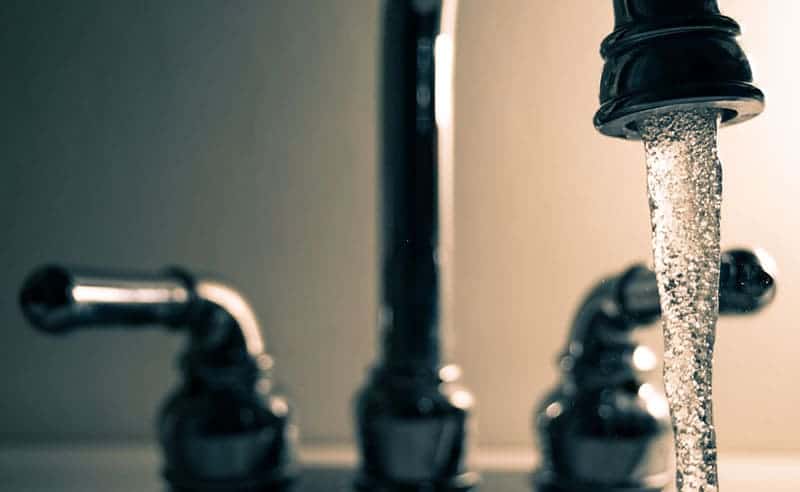
The more urgent the problem, the faster you come up with creative solutions to solve the problem of the Stop water shortage. However, we consumers can certainly achieve the greatest effect in combination with business and politics by promoting a consciously sustainable lifestyle. This is necessary because otherwise we are threatened with even worse consequences than we are already experiencing today.
"The wars of the future will be fought over water."
Boutros Boutros-Ghali, former UN Secretary-General₂₂
The channel Y collective has on YouTube the great documentary "On dry land - A city of millions is running out of water". about Cape Town in South Africa. I can really recommend this documentary to everyone, because it illustrates the consequences of the water shortage very tangibly.
Do you have questions, tips or your own experience with the environmental problem of water scarcity? Then feel free to leave me a comment below this post. Please also share this article with others to educate as many people as possible, as quickly as possible.
Stay clean,

PS.: In the Environmental protection blog there is a lot more info and tips & tricks for a sustainable everyday life. Take a look!
References:
₁ https://www3.hhu.de/biodidaktik/WasserSek_I/wo_findet_man_wasser/dateien/wasser_auf_der_erde.html
₂ https://www.focus.de/wissen/klima/in-ostwestfalen-feuerwehr-warnt-mit-lautsprecherdurchsagen-ersten-gemeinden-geht-das-wasser-aus_id_10866393.html
₃ https://utopia.de/nestle-wasser-vittel-90266
₄ https://rp-online.de/panorama/wissen/jeder-mensch-benoetigt-1000000-liter-wasser-pro-jahr_aid-11094253
₅,₆ https://www.energiesparer.org/wasser/trinkwasser
₇ https://www.unicef.de/informieren/aktuelles/blog/weltwasserwoche-2018-zehn-fakten-ueber-wasser/172968
₈ https://www.unicef.de/informieren/aktuelles/blog/weltwasserwoche-2018-zehn-fakten-ueber-wasser/172968
₉ https://blog.wwf.de/5-dinge-gegen-die-wasser-krise
₁₀ https://de.statista.com/statistik/daten/studie/3220/umfrage/eu-laender-nach-suesswasserressourcen-pro-kopf-in-2006
₁₁ http://www.bpb.de/nachschlagen/zahlen-und-fakten/globalisierung/52730/wasserverbrauch
₁₂ https://www.stern.de/panorama/wissen/natur/wasserverbrauch-4000-liter-jeder-mensch-jeden-tag-3603204.html
₁₃ https://www.umweltbundesamt.de/sites/default/files/medien/publikation/long/3642.pdf
₁₄ https://de.wikipedia.org/wiki/Bevölkerungsentwicklung
₁₅ https://www.klimafakten.de/meldung/klimawandel-eine-faktenliste
₁₆ http://www.wassermangel.eu/duerrekatastrophe.html
₁₇ https://www.youtube.com/watch?v=idNMLTii9EI
₁₈ https://www.welthungerhilfe.de/hunger
₁₉,₂₀ https://www.unicef.de/informieren/aktuelles/blog/weltwasserwoche-2018-zehn-fakten-ueber-wasser/172968
₂₁ https://waterfootprint.org/media/downloads/Hoekstra_and_Chapagain_2006.pdf
₂₂ http://www.science-skeptical.de/blog/warum-es-keine-kriege-um-wasser-geben-wird/007006

